Entrepreneurship and Small Businesses: Ventures, Economy, and Traits
VerifiedAdded on 2023/01/18
|19
|4921
|26
Report
AI Summary
This report on entrepreneurship and small business management provides a comprehensive overview of various entrepreneurial ventures, including small, large, scalable, and social ventures. It explores the similarities and differences between these venture types and how they relate to entrepreneurial typologies, such as male/female and lifestyle/survival classifications. The report delves into the significant impact of micro and small businesses on the UK economy, supported by relevant data and statistics regarding employment, GDP, and women's empowerment. Furthermore, it examines the importance of small businesses and start-ups in fostering the growth of the social economy, outlining the four pillars of the social economy: mutuals, foundations, charities, and associations. The report also analyzes the characteristic traits and skills of successful entrepreneurs, differentiating them from traditional business managers and assessing how entrepreneurial personality traits reflect motivation and mindset. Finally, it examines how background and experience can either hinder or foster entrepreneurship, providing valuable insights into the multifaceted nature of entrepreneurial success.

Entrepreneurship and
Small Businesses
Management
Small Businesses
Management
Paraphrase This Document
Need a fresh take? Get an instant paraphrase of this document with our AI Paraphraser
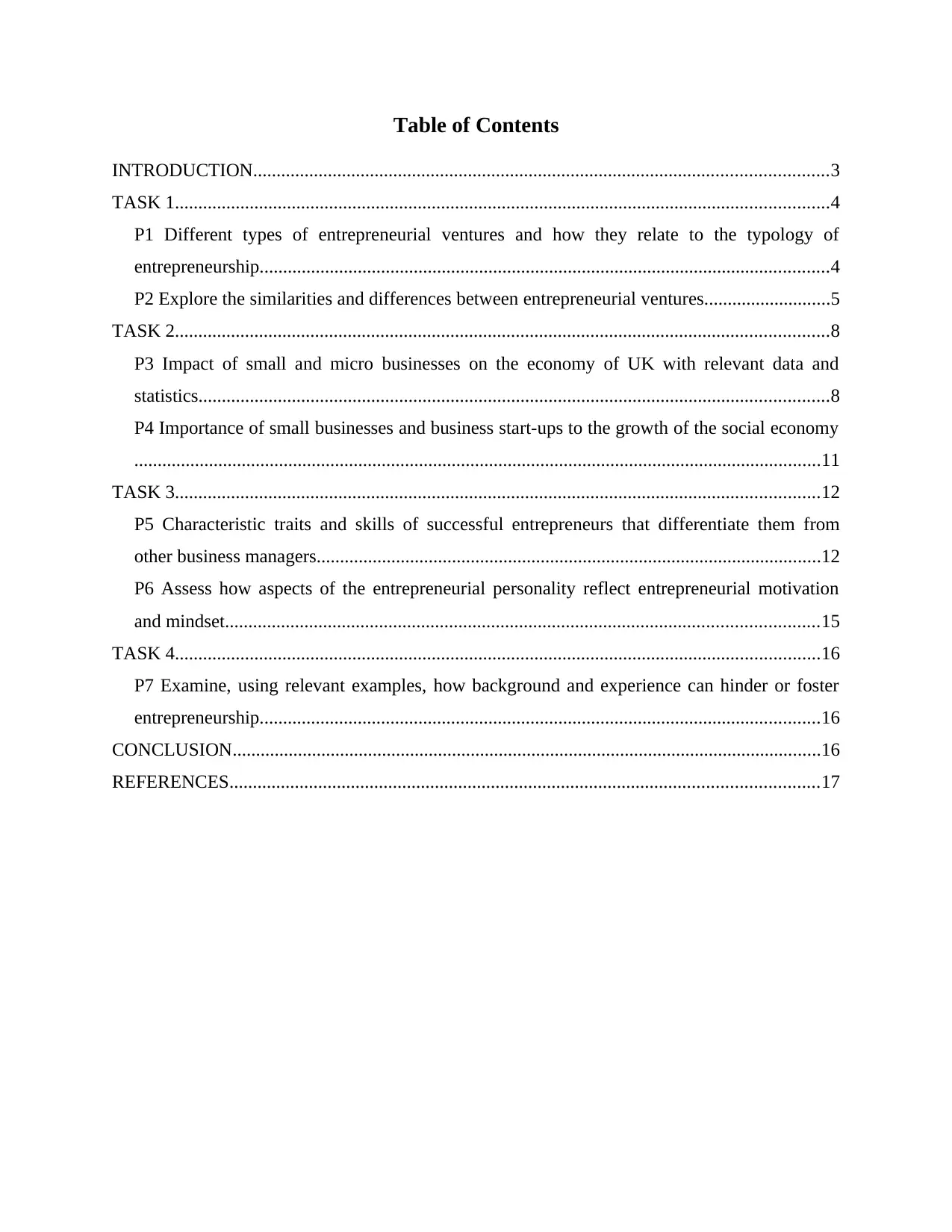
Table of Contents
INTRODUCTION...........................................................................................................................3
TASK 1............................................................................................................................................4
P1 Different types of entrepreneurial ventures and how they relate to the typology of
entrepreneurship..........................................................................................................................4
P2 Explore the similarities and differences between entrepreneurial ventures...........................5
TASK 2............................................................................................................................................8
P3 Impact of small and micro businesses on the economy of UK with relevant data and
statistics.......................................................................................................................................8
P4 Importance of small businesses and business start-ups to the growth of the social economy
...................................................................................................................................................11
TASK 3..........................................................................................................................................12
P5 Characteristic traits and skills of successful entrepreneurs that differentiate them from
other business managers............................................................................................................12
P6 Assess how aspects of the entrepreneurial personality reflect entrepreneurial motivation
and mindset...............................................................................................................................15
TASK 4..........................................................................................................................................16
P7 Examine, using relevant examples, how background and experience can hinder or foster
entrepreneurship........................................................................................................................16
CONCLUSION..............................................................................................................................16
REFERENCES..............................................................................................................................17
INTRODUCTION...........................................................................................................................3
TASK 1............................................................................................................................................4
P1 Different types of entrepreneurial ventures and how they relate to the typology of
entrepreneurship..........................................................................................................................4
P2 Explore the similarities and differences between entrepreneurial ventures...........................5
TASK 2............................................................................................................................................8
P3 Impact of small and micro businesses on the economy of UK with relevant data and
statistics.......................................................................................................................................8
P4 Importance of small businesses and business start-ups to the growth of the social economy
...................................................................................................................................................11
TASK 3..........................................................................................................................................12
P5 Characteristic traits and skills of successful entrepreneurs that differentiate them from
other business managers............................................................................................................12
P6 Assess how aspects of the entrepreneurial personality reflect entrepreneurial motivation
and mindset...............................................................................................................................15
TASK 4..........................................................................................................................................16
P7 Examine, using relevant examples, how background and experience can hinder or foster
entrepreneurship........................................................................................................................16
CONCLUSION..............................................................................................................................16
REFERENCES..............................................................................................................................17
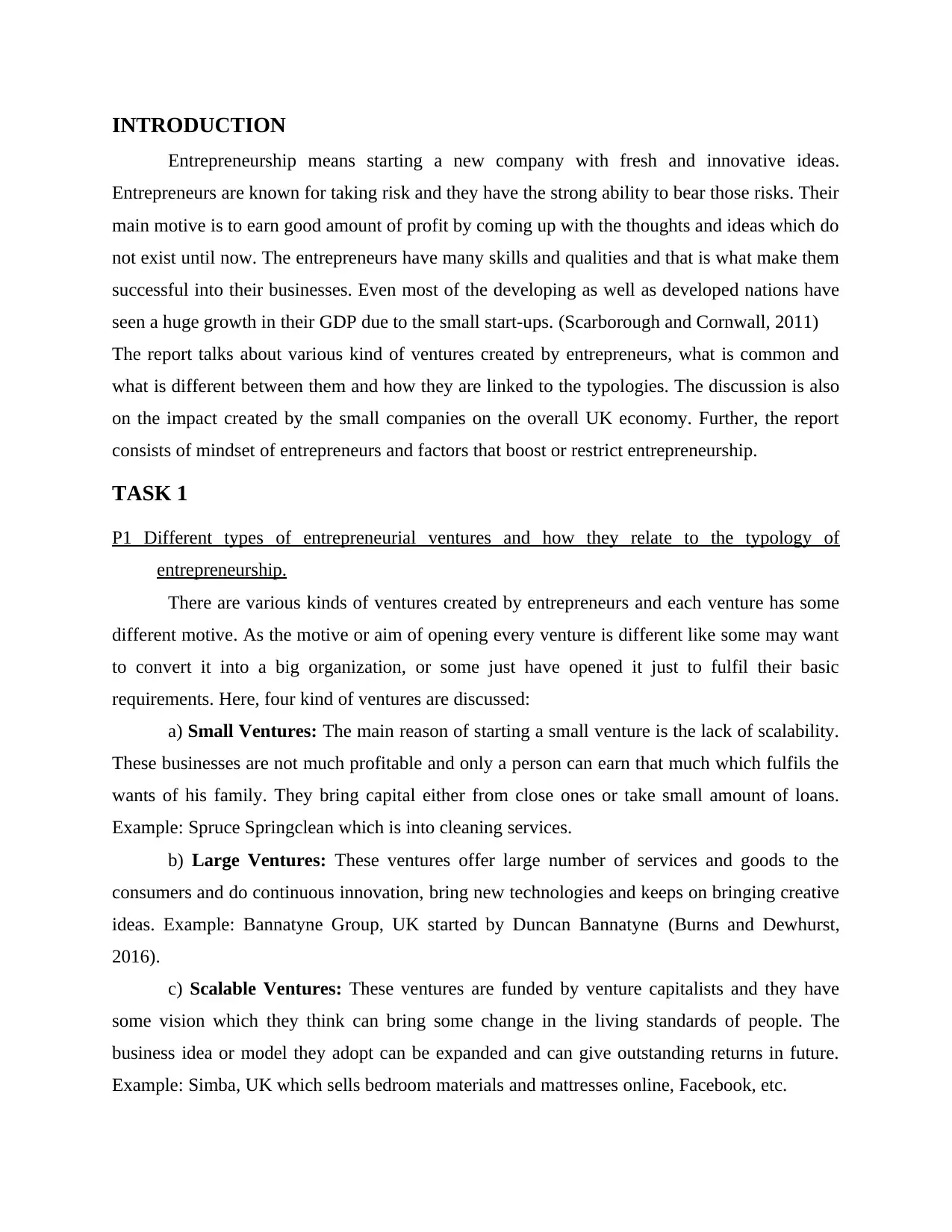
INTRODUCTION
Entrepreneurship means starting a new company with fresh and innovative ideas.
Entrepreneurs are known for taking risk and they have the strong ability to bear those risks. Their
main motive is to earn good amount of profit by coming up with the thoughts and ideas which do
not exist until now. The entrepreneurs have many skills and qualities and that is what make them
successful into their businesses. Even most of the developing as well as developed nations have
seen a huge growth in their GDP due to the small start-ups. (Scarborough and Cornwall, 2011)
The report talks about various kind of ventures created by entrepreneurs, what is common and
what is different between them and how they are linked to the typologies. The discussion is also
on the impact created by the small companies on the overall UK economy. Further, the report
consists of mindset of entrepreneurs and factors that boost or restrict entrepreneurship.
TASK 1
P1 Different types of entrepreneurial ventures and how they relate to the typology of
entrepreneurship.
There are various kinds of ventures created by entrepreneurs and each venture has some
different motive. As the motive or aim of opening every venture is different like some may want
to convert it into a big organization, or some just have opened it just to fulfil their basic
requirements. Here, four kind of ventures are discussed:
a) Small Ventures: The main reason of starting a small venture is the lack of scalability.
These businesses are not much profitable and only a person can earn that much which fulfils the
wants of his family. They bring capital either from close ones or take small amount of loans.
Example: Spruce Springclean which is into cleaning services.
b) Large Ventures: These ventures offer large number of services and goods to the
consumers and do continuous innovation, bring new technologies and keeps on bringing creative
ideas. Example: Bannatyne Group, UK started by Duncan Bannatyne (Burns and Dewhurst,
2016).
c) Scalable Ventures: These ventures are funded by venture capitalists and they have
some vision which they think can bring some change in the living standards of people. The
business idea or model they adopt can be expanded and can give outstanding returns in future.
Example: Simba, UK which sells bedroom materials and mattresses online, Facebook, etc.
Entrepreneurship means starting a new company with fresh and innovative ideas.
Entrepreneurs are known for taking risk and they have the strong ability to bear those risks. Their
main motive is to earn good amount of profit by coming up with the thoughts and ideas which do
not exist until now. The entrepreneurs have many skills and qualities and that is what make them
successful into their businesses. Even most of the developing as well as developed nations have
seen a huge growth in their GDP due to the small start-ups. (Scarborough and Cornwall, 2011)
The report talks about various kind of ventures created by entrepreneurs, what is common and
what is different between them and how they are linked to the typologies. The discussion is also
on the impact created by the small companies on the overall UK economy. Further, the report
consists of mindset of entrepreneurs and factors that boost or restrict entrepreneurship.
TASK 1
P1 Different types of entrepreneurial ventures and how they relate to the typology of
entrepreneurship.
There are various kinds of ventures created by entrepreneurs and each venture has some
different motive. As the motive or aim of opening every venture is different like some may want
to convert it into a big organization, or some just have opened it just to fulfil their basic
requirements. Here, four kind of ventures are discussed:
a) Small Ventures: The main reason of starting a small venture is the lack of scalability.
These businesses are not much profitable and only a person can earn that much which fulfils the
wants of his family. They bring capital either from close ones or take small amount of loans.
Example: Spruce Springclean which is into cleaning services.
b) Large Ventures: These ventures offer large number of services and goods to the
consumers and do continuous innovation, bring new technologies and keeps on bringing creative
ideas. Example: Bannatyne Group, UK started by Duncan Bannatyne (Burns and Dewhurst,
2016).
c) Scalable Ventures: These ventures are funded by venture capitalists and they have
some vision which they think can bring some change in the living standards of people. The
business idea or model they adopt can be expanded and can give outstanding returns in future.
Example: Simba, UK which sells bedroom materials and mattresses online, Facebook, etc.
⊘ This is a preview!⊘
Do you want full access?
Subscribe today to unlock all pages.

Trusted by 1+ million students worldwide

d) Social Ventures: These ventures are created with the motive of bringing societal
change in the world. They make goods which solves social issues. They are not started with the
aim of earning profits. Example: Gravity Light, founded by Martin and Jim
Relation to the Entrepreneurship Typologies: Typologies basically means
classification done on the basis of certain factors. In entrepreneurship terms, there can be
different typologies like based on gender there can be male and female typologies, lifestyle and
survival typologies (Burns, 2016). Start-ups differ in terms of their investment, the owners who
have started the organization and the motive behind starting the company.
Male: The start-ups which are created by men are generally risk taking start-ups as men
have the ability to bear more risk as they have the vision of earning more returns. They are less
emotional as compared to women. They can deal the worst situations in a better manner as they
are competent, risk dealers and fast decision makers.
Female: Females are more emotional then men and hence end up taking less risk when
compared to men. They usually go for social start-ups and works for betterment of the nation.
Today also, many ventures started by female faces difficulty in getting capital from the venture
capitalists as the question of sustainability arises as per some research (Nakara, Benmoussa and
Jaouen, 2012).
Survival: The sole motive of this kind of start-up is survival in this competitive era. They
are less profitable and hence earn that much profit with which they can live and sustain well.
They just want to sustain in the market by either reducing the costs or increasing the prices.
Lifestyle: There are some start-ups which have started to improve the living standards of
people in the society. They usually include social as well as scalable ventures as both of them
improve people's lives in some way or other.
P2 Explore the similarities and differences between entrepreneurial ventures.
Similarities between small vs large entrepreneurial ventures:
change in the world. They make goods which solves social issues. They are not started with the
aim of earning profits. Example: Gravity Light, founded by Martin and Jim
Relation to the Entrepreneurship Typologies: Typologies basically means
classification done on the basis of certain factors. In entrepreneurship terms, there can be
different typologies like based on gender there can be male and female typologies, lifestyle and
survival typologies (Burns, 2016). Start-ups differ in terms of their investment, the owners who
have started the organization and the motive behind starting the company.
Male: The start-ups which are created by men are generally risk taking start-ups as men
have the ability to bear more risk as they have the vision of earning more returns. They are less
emotional as compared to women. They can deal the worst situations in a better manner as they
are competent, risk dealers and fast decision makers.
Female: Females are more emotional then men and hence end up taking less risk when
compared to men. They usually go for social start-ups and works for betterment of the nation.
Today also, many ventures started by female faces difficulty in getting capital from the venture
capitalists as the question of sustainability arises as per some research (Nakara, Benmoussa and
Jaouen, 2012).
Survival: The sole motive of this kind of start-up is survival in this competitive era. They
are less profitable and hence earn that much profit with which they can live and sustain well.
They just want to sustain in the market by either reducing the costs or increasing the prices.
Lifestyle: There are some start-ups which have started to improve the living standards of
people in the society. They usually include social as well as scalable ventures as both of them
improve people's lives in some way or other.
P2 Explore the similarities and differences between entrepreneurial ventures.
Similarities between small vs large entrepreneurial ventures:
Paraphrase This Document
Need a fresh take? Get an instant paraphrase of this document with our AI Paraphraser
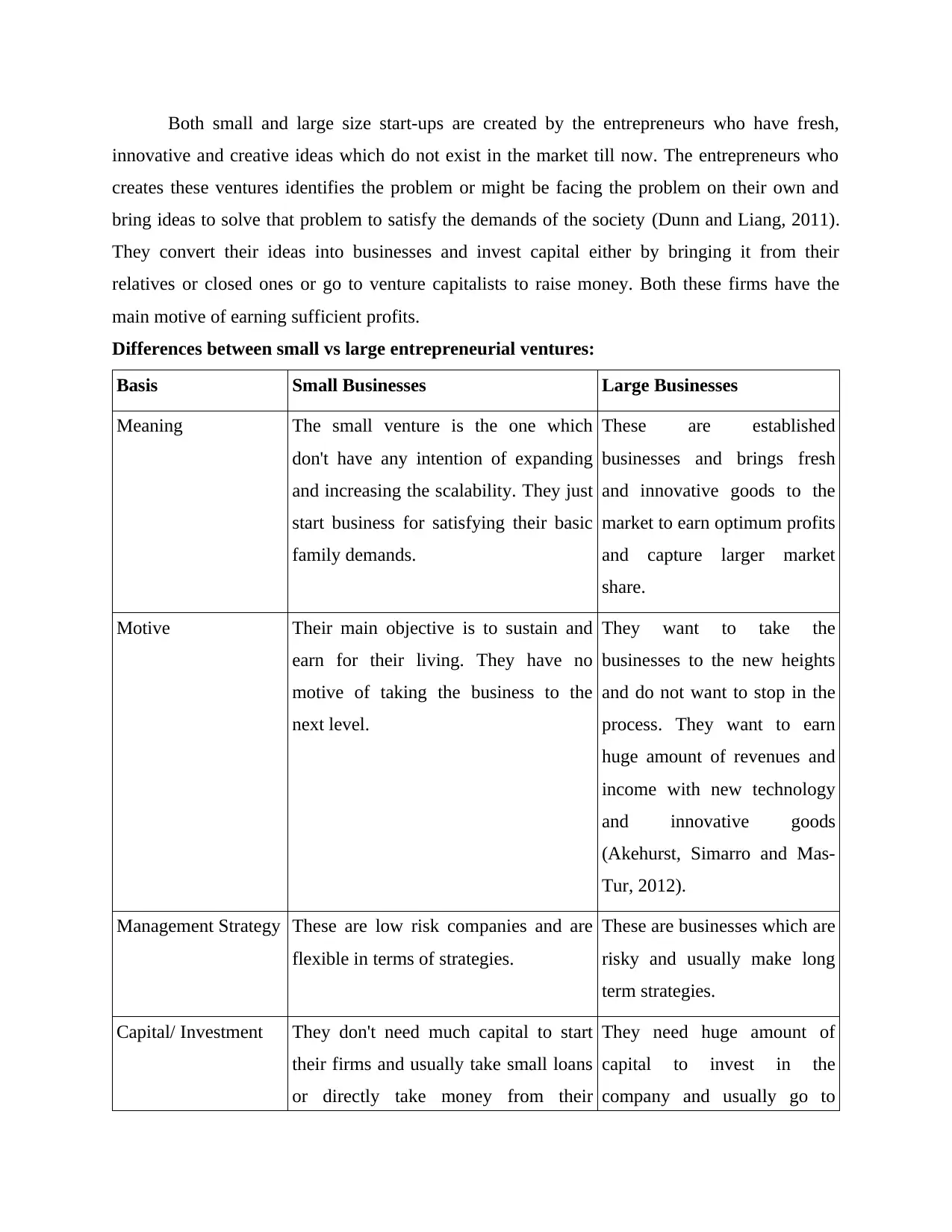
Both small and large size start-ups are created by the entrepreneurs who have fresh,
innovative and creative ideas which do not exist in the market till now. The entrepreneurs who
creates these ventures identifies the problem or might be facing the problem on their own and
bring ideas to solve that problem to satisfy the demands of the society (Dunn and Liang, 2011).
They convert their ideas into businesses and invest capital either by bringing it from their
relatives or closed ones or go to venture capitalists to raise money. Both these firms have the
main motive of earning sufficient profits.
Differences between small vs large entrepreneurial ventures:
Basis Small Businesses Large Businesses
Meaning The small venture is the one which
don't have any intention of expanding
and increasing the scalability. They just
start business for satisfying their basic
family demands.
These are established
businesses and brings fresh
and innovative goods to the
market to earn optimum profits
and capture larger market
share.
Motive Their main objective is to sustain and
earn for their living. They have no
motive of taking the business to the
next level.
They want to take the
businesses to the new heights
and do not want to stop in the
process. They want to earn
huge amount of revenues and
income with new technology
and innovative goods
(Akehurst, Simarro and Mas‐
Tur, 2012).
Management Strategy These are low risk companies and are
flexible in terms of strategies.
These are businesses which are
risky and usually make long
term strategies.
Capital/ Investment They don't need much capital to start
their firms and usually take small loans
or directly take money from their
They need huge amount of
capital to invest in the
company and usually go to
innovative and creative ideas which do not exist in the market till now. The entrepreneurs who
creates these ventures identifies the problem or might be facing the problem on their own and
bring ideas to solve that problem to satisfy the demands of the society (Dunn and Liang, 2011).
They convert their ideas into businesses and invest capital either by bringing it from their
relatives or closed ones or go to venture capitalists to raise money. Both these firms have the
main motive of earning sufficient profits.
Differences between small vs large entrepreneurial ventures:
Basis Small Businesses Large Businesses
Meaning The small venture is the one which
don't have any intention of expanding
and increasing the scalability. They just
start business for satisfying their basic
family demands.
These are established
businesses and brings fresh
and innovative goods to the
market to earn optimum profits
and capture larger market
share.
Motive Their main objective is to sustain and
earn for their living. They have no
motive of taking the business to the
next level.
They want to take the
businesses to the new heights
and do not want to stop in the
process. They want to earn
huge amount of revenues and
income with new technology
and innovative goods
(Akehurst, Simarro and Mas‐
Tur, 2012).
Management Strategy These are low risk companies and are
flexible in terms of strategies.
These are businesses which are
risky and usually make long
term strategies.
Capital/ Investment They don't need much capital to start
their firms and usually take small loans
or directly take money from their
They need huge amount of
capital to invest in the
company and usually go to
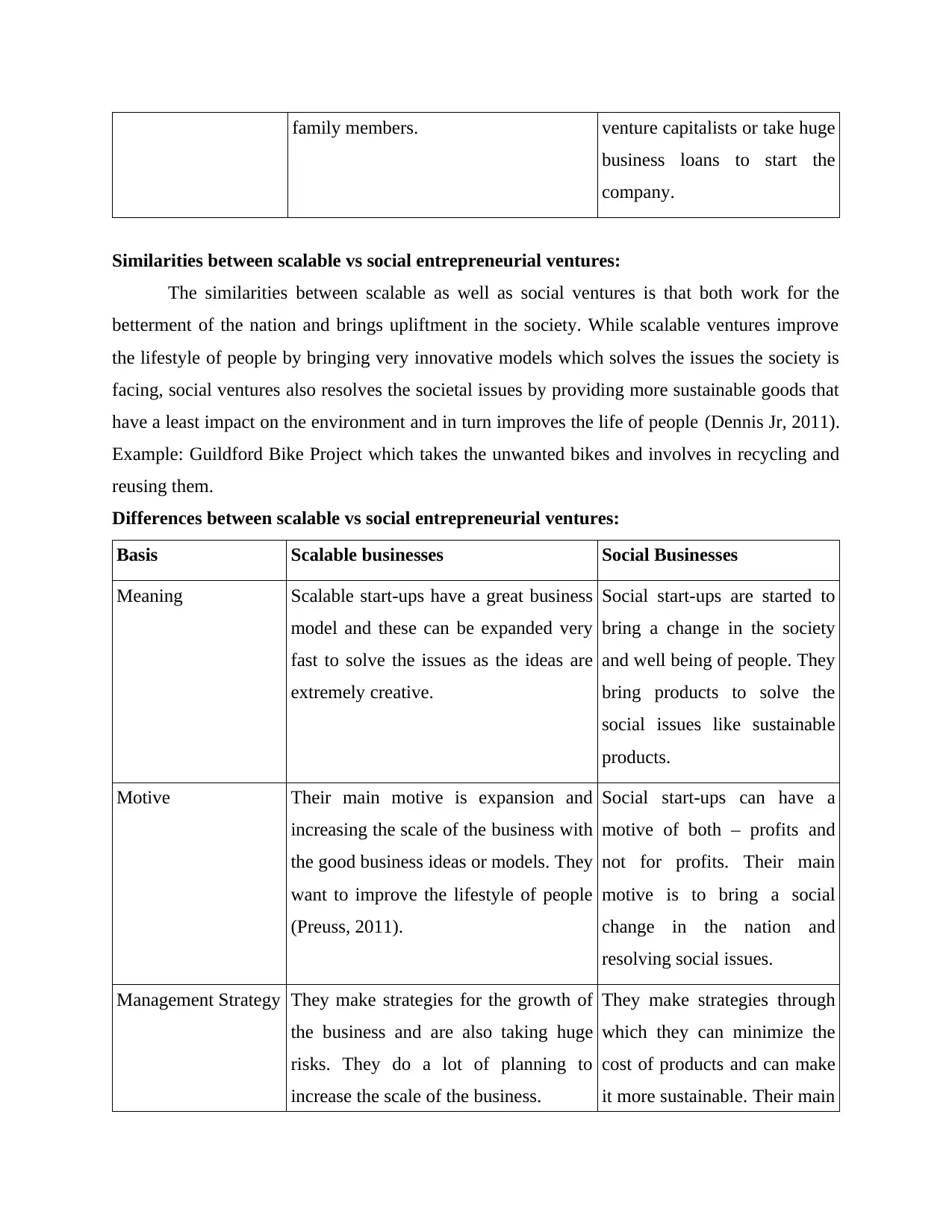
family members. venture capitalists or take huge
business loans to start the
company.
Similarities between scalable vs social entrepreneurial ventures:
The similarities between scalable as well as social ventures is that both work for the
betterment of the nation and brings upliftment in the society. While scalable ventures improve
the lifestyle of people by bringing very innovative models which solves the issues the society is
facing, social ventures also resolves the societal issues by providing more sustainable goods that
have a least impact on the environment and in turn improves the life of people (Dennis Jr, 2011).
Example: Guildford Bike Project which takes the unwanted bikes and involves in recycling and
reusing them.
Differences between scalable vs social entrepreneurial ventures:
Basis Scalable businesses Social Businesses
Meaning Scalable start-ups have a great business
model and these can be expanded very
fast to solve the issues as the ideas are
extremely creative.
Social start-ups are started to
bring a change in the society
and well being of people. They
bring products to solve the
social issues like sustainable
products.
Motive Their main motive is expansion and
increasing the scale of the business with
the good business ideas or models. They
want to improve the lifestyle of people
(Preuss, 2011).
Social start-ups can have a
motive of both – profits and
not for profits. Their main
motive is to bring a social
change in the nation and
resolving social issues.
Management Strategy They make strategies for the growth of
the business and are also taking huge
risks. They do a lot of planning to
increase the scale of the business.
They make strategies through
which they can minimize the
cost of products and can make
it more sustainable. Their main
business loans to start the
company.
Similarities between scalable vs social entrepreneurial ventures:
The similarities between scalable as well as social ventures is that both work for the
betterment of the nation and brings upliftment in the society. While scalable ventures improve
the lifestyle of people by bringing very innovative models which solves the issues the society is
facing, social ventures also resolves the societal issues by providing more sustainable goods that
have a least impact on the environment and in turn improves the life of people (Dennis Jr, 2011).
Example: Guildford Bike Project which takes the unwanted bikes and involves in recycling and
reusing them.
Differences between scalable vs social entrepreneurial ventures:
Basis Scalable businesses Social Businesses
Meaning Scalable start-ups have a great business
model and these can be expanded very
fast to solve the issues as the ideas are
extremely creative.
Social start-ups are started to
bring a change in the society
and well being of people. They
bring products to solve the
social issues like sustainable
products.
Motive Their main motive is expansion and
increasing the scale of the business with
the good business ideas or models. They
want to improve the lifestyle of people
(Preuss, 2011).
Social start-ups can have a
motive of both – profits and
not for profits. Their main
motive is to bring a social
change in the nation and
resolving social issues.
Management Strategy They make strategies for the growth of
the business and are also taking huge
risks. They do a lot of planning to
increase the scale of the business.
They make strategies through
which they can minimize the
cost of products and can make
it more sustainable. Their main
⊘ This is a preview!⊘
Do you want full access?
Subscribe today to unlock all pages.

Trusted by 1+ million students worldwide
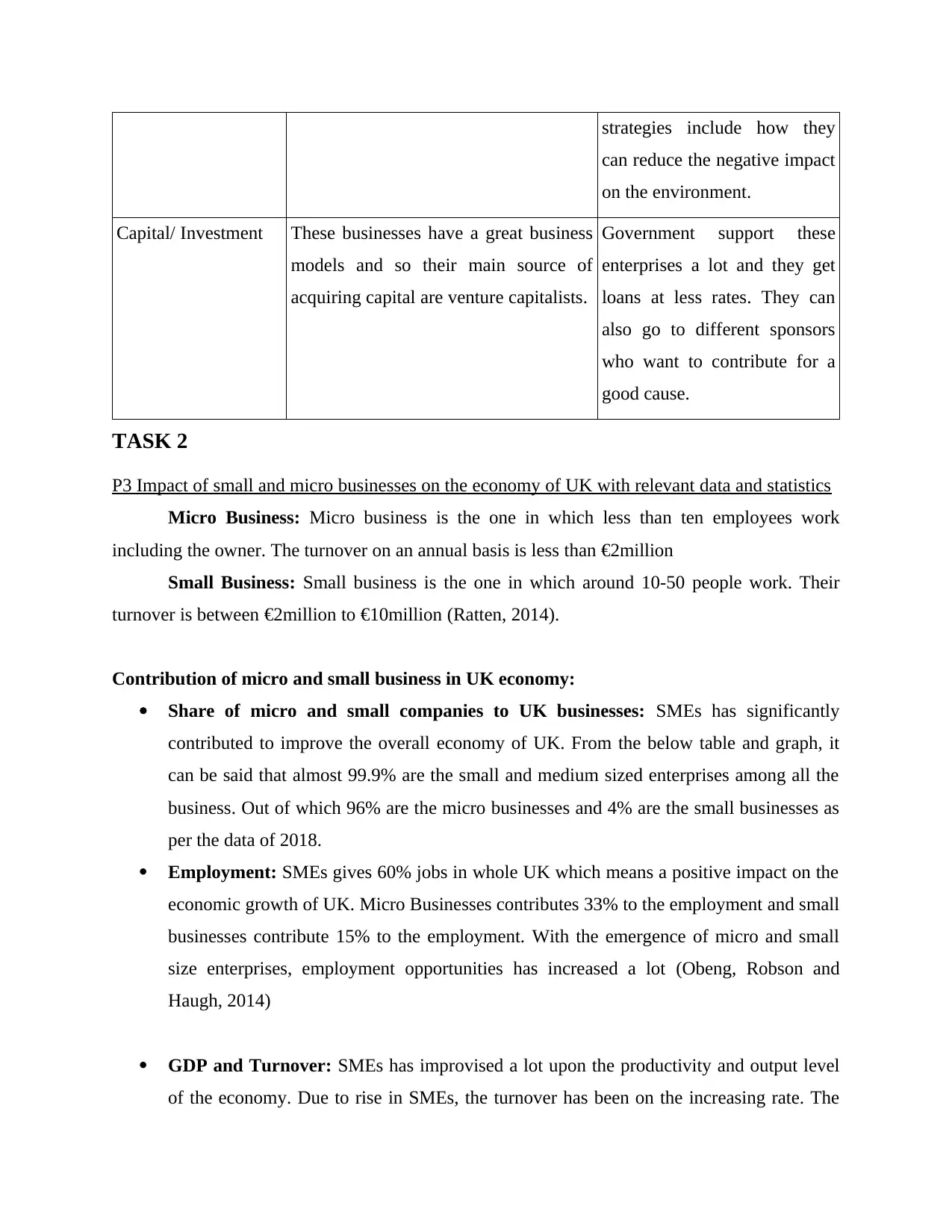
strategies include how they
can reduce the negative impact
on the environment.
Capital/ Investment These businesses have a great business
models and so their main source of
acquiring capital are venture capitalists.
Government support these
enterprises a lot and they get
loans at less rates. They can
also go to different sponsors
who want to contribute for a
good cause.
TASK 2
P3 Impact of small and micro businesses on the economy of UK with relevant data and statistics
Micro Business: Micro business is the one in which less than ten employees work
including the owner. The turnover on an annual basis is less than €2million
Small Business: Small business is the one in which around 10-50 people work. Their
turnover is between €2million to €10million (Ratten, 2014).
Contribution of micro and small business in UK economy:
Share of micro and small companies to UK businesses: SMEs has significantly
contributed to improve the overall economy of UK. From the below table and graph, it
can be said that almost 99.9% are the small and medium sized enterprises among all the
business. Out of which 96% are the micro businesses and 4% are the small businesses as
per the data of 2018.
Employment: SMEs gives 60% jobs in whole UK which means a positive impact on the
economic growth of UK. Micro Businesses contributes 33% to the employment and small
businesses contribute 15% to the employment. With the emergence of micro and small
size enterprises, employment opportunities has increased a lot (Obeng, Robson and
Haugh, 2014)
GDP and Turnover: SMEs has improvised a lot upon the productivity and output level
of the economy. Due to rise in SMEs, the turnover has been on the increasing rate. The
can reduce the negative impact
on the environment.
Capital/ Investment These businesses have a great business
models and so their main source of
acquiring capital are venture capitalists.
Government support these
enterprises a lot and they get
loans at less rates. They can
also go to different sponsors
who want to contribute for a
good cause.
TASK 2
P3 Impact of small and micro businesses on the economy of UK with relevant data and statistics
Micro Business: Micro business is the one in which less than ten employees work
including the owner. The turnover on an annual basis is less than €2million
Small Business: Small business is the one in which around 10-50 people work. Their
turnover is between €2million to €10million (Ratten, 2014).
Contribution of micro and small business in UK economy:
Share of micro and small companies to UK businesses: SMEs has significantly
contributed to improve the overall economy of UK. From the below table and graph, it
can be said that almost 99.9% are the small and medium sized enterprises among all the
business. Out of which 96% are the micro businesses and 4% are the small businesses as
per the data of 2018.
Employment: SMEs gives 60% jobs in whole UK which means a positive impact on the
economic growth of UK. Micro Businesses contributes 33% to the employment and small
businesses contribute 15% to the employment. With the emergence of micro and small
size enterprises, employment opportunities has increased a lot (Obeng, Robson and
Haugh, 2014)
GDP and Turnover: SMEs has improvised a lot upon the productivity and output level
of the economy. Due to rise in SMEs, the turnover has been on the increasing rate. The
Paraphrase This Document
Need a fresh take? Get an instant paraphrase of this document with our AI Paraphraser
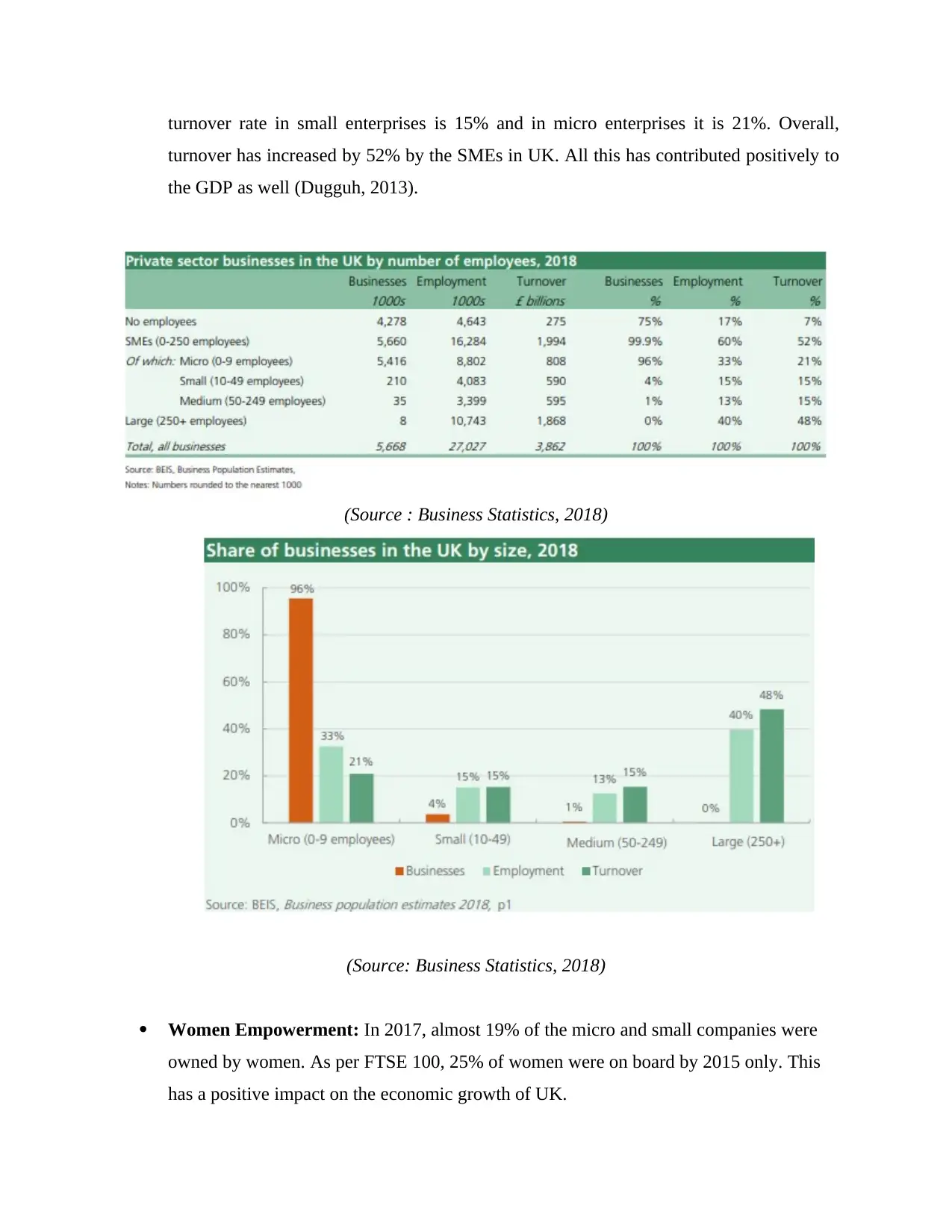
turnover rate in small enterprises is 15% and in micro enterprises it is 21%. Overall,
turnover has increased by 52% by the SMEs in UK. All this has contributed positively to
the GDP as well (Dugguh, 2013).
(Source : Business Statistics, 2018)
(Source: Business Statistics, 2018)
Women Empowerment: In 2017, almost 19% of the micro and small companies were
owned by women. As per FTSE 100, 25% of women were on board by 2015 only. This
has a positive impact on the economic growth of UK.
turnover has increased by 52% by the SMEs in UK. All this has contributed positively to
the GDP as well (Dugguh, 2013).
(Source : Business Statistics, 2018)
(Source: Business Statistics, 2018)
Women Empowerment: In 2017, almost 19% of the micro and small companies were
owned by women. As per FTSE 100, 25% of women were on board by 2015 only. This
has a positive impact on the economic growth of UK.
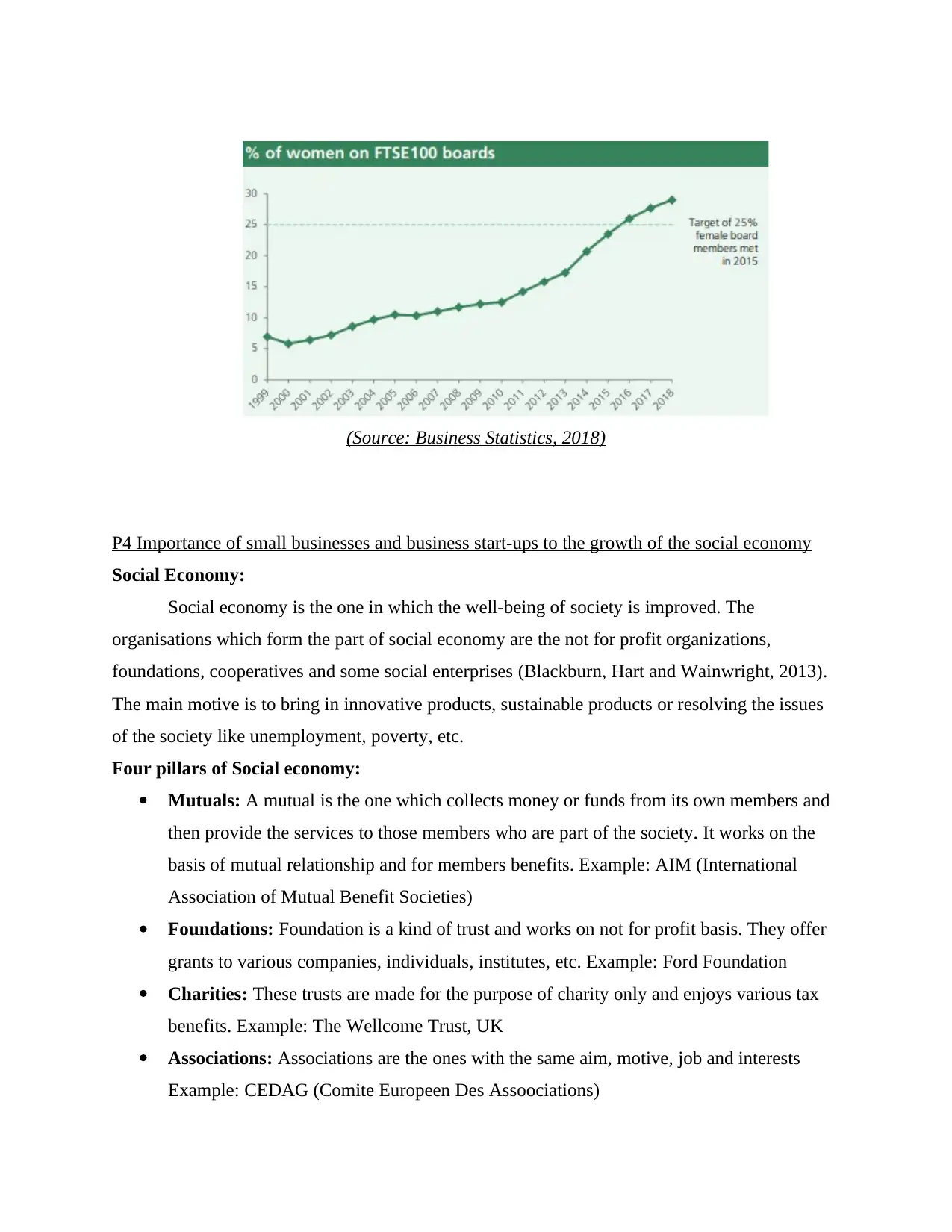
(Source: Business Statistics, 2018)
P4 Importance of small businesses and business start-ups to the growth of the social economy
Social Economy:
Social economy is the one in which the well-being of society is improved. The
organisations which form the part of social economy are the not for profit organizations,
foundations, cooperatives and some social enterprises (Blackburn, Hart and Wainwright, 2013).
The main motive is to bring in innovative products, sustainable products or resolving the issues
of the society like unemployment, poverty, etc.
Four pillars of Social economy:
Mutuals: A mutual is the one which collects money or funds from its own members and
then provide the services to those members who are part of the society. It works on the
basis of mutual relationship and for members benefits. Example: AIM (International
Association of Mutual Benefit Societies)
Foundations: Foundation is a kind of trust and works on not for profit basis. They offer
grants to various companies, individuals, institutes, etc. Example: Ford Foundation
Charities: These trusts are made for the purpose of charity only and enjoys various tax
benefits. Example: The Wellcome Trust, UK
Associations: Associations are the ones with the same aim, motive, job and interests
Example: CEDAG (Comite Europeen Des Assoociations)
P4 Importance of small businesses and business start-ups to the growth of the social economy
Social Economy:
Social economy is the one in which the well-being of society is improved. The
organisations which form the part of social economy are the not for profit organizations,
foundations, cooperatives and some social enterprises (Blackburn, Hart and Wainwright, 2013).
The main motive is to bring in innovative products, sustainable products or resolving the issues
of the society like unemployment, poverty, etc.
Four pillars of Social economy:
Mutuals: A mutual is the one which collects money or funds from its own members and
then provide the services to those members who are part of the society. It works on the
basis of mutual relationship and for members benefits. Example: AIM (International
Association of Mutual Benefit Societies)
Foundations: Foundation is a kind of trust and works on not for profit basis. They offer
grants to various companies, individuals, institutes, etc. Example: Ford Foundation
Charities: These trusts are made for the purpose of charity only and enjoys various tax
benefits. Example: The Wellcome Trust, UK
Associations: Associations are the ones with the same aim, motive, job and interests
Example: CEDAG (Comite Europeen Des Assoociations)
⊘ This is a preview!⊘
Do you want full access?
Subscribe today to unlock all pages.

Trusted by 1+ million students worldwide
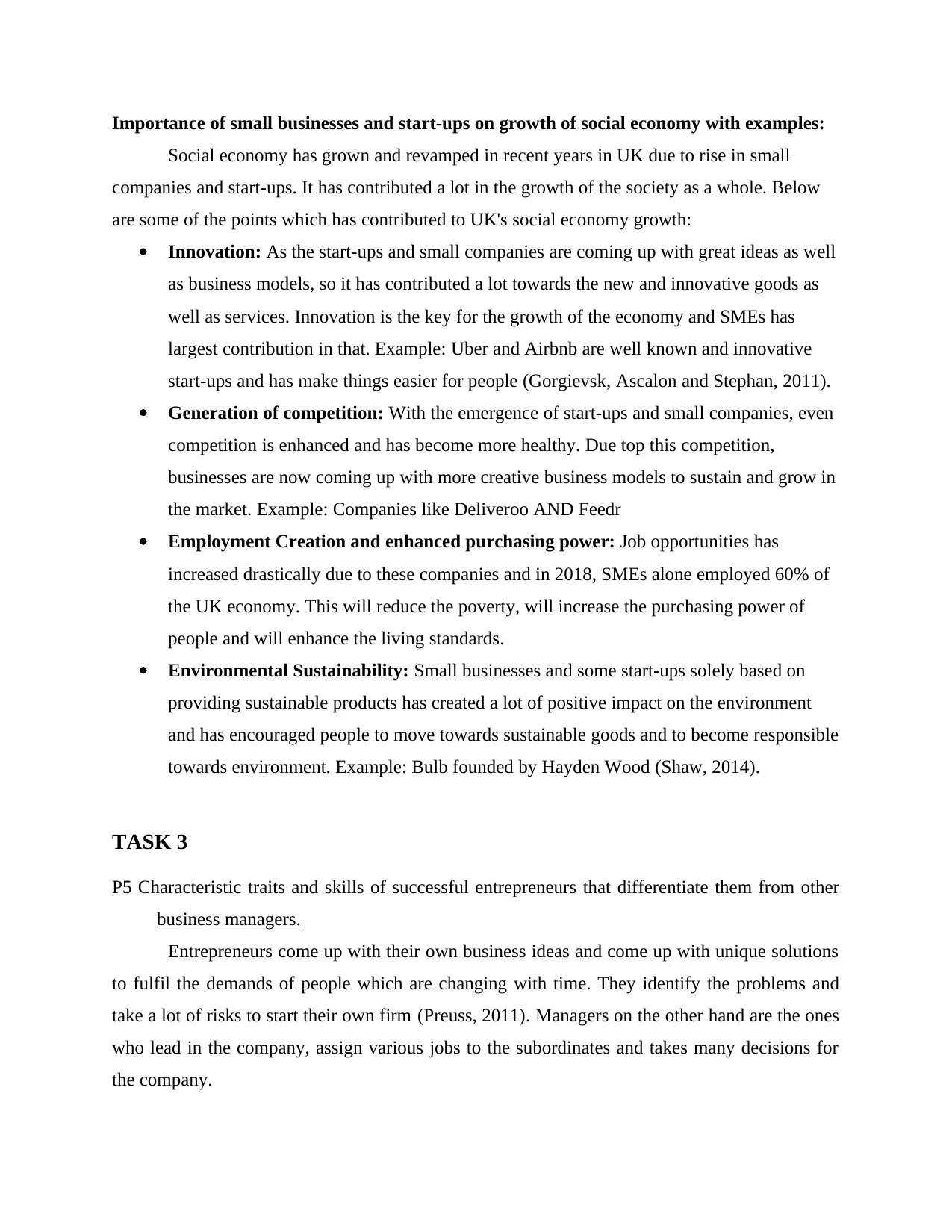
Importance of small businesses and start-ups on growth of social economy with examples:
Social economy has grown and revamped in recent years in UK due to rise in small
companies and start-ups. It has contributed a lot in the growth of the society as a whole. Below
are some of the points which has contributed to UK's social economy growth:
Innovation: As the start-ups and small companies are coming up with great ideas as well
as business models, so it has contributed a lot towards the new and innovative goods as
well as services. Innovation is the key for the growth of the economy and SMEs has
largest contribution in that. Example: Uber and Airbnb are well known and innovative
start-ups and has make things easier for people (Gorgievsk, Ascalon and Stephan, 2011).
Generation of competition: With the emergence of start-ups and small companies, even
competition is enhanced and has become more healthy. Due top this competition,
businesses are now coming up with more creative business models to sustain and grow in
the market. Example: Companies like Deliveroo AND Feedr
Employment Creation and enhanced purchasing power: Job opportunities has
increased drastically due to these companies and in 2018, SMEs alone employed 60% of
the UK economy. This will reduce the poverty, will increase the purchasing power of
people and will enhance the living standards.
Environmental Sustainability: Small businesses and some start-ups solely based on
providing sustainable products has created a lot of positive impact on the environment
and has encouraged people to move towards sustainable goods and to become responsible
towards environment. Example: Bulb founded by Hayden Wood (Shaw, 2014).
TASK 3
P5 Characteristic traits and skills of successful entrepreneurs that differentiate them from other
business managers.
Entrepreneurs come up with their own business ideas and come up with unique solutions
to fulfil the demands of people which are changing with time. They identify the problems and
take a lot of risks to start their own firm (Preuss, 2011). Managers on the other hand are the ones
who lead in the company, assign various jobs to the subordinates and takes many decisions for
the company.
Social economy has grown and revamped in recent years in UK due to rise in small
companies and start-ups. It has contributed a lot in the growth of the society as a whole. Below
are some of the points which has contributed to UK's social economy growth:
Innovation: As the start-ups and small companies are coming up with great ideas as well
as business models, so it has contributed a lot towards the new and innovative goods as
well as services. Innovation is the key for the growth of the economy and SMEs has
largest contribution in that. Example: Uber and Airbnb are well known and innovative
start-ups and has make things easier for people (Gorgievsk, Ascalon and Stephan, 2011).
Generation of competition: With the emergence of start-ups and small companies, even
competition is enhanced and has become more healthy. Due top this competition,
businesses are now coming up with more creative business models to sustain and grow in
the market. Example: Companies like Deliveroo AND Feedr
Employment Creation and enhanced purchasing power: Job opportunities has
increased drastically due to these companies and in 2018, SMEs alone employed 60% of
the UK economy. This will reduce the poverty, will increase the purchasing power of
people and will enhance the living standards.
Environmental Sustainability: Small businesses and some start-ups solely based on
providing sustainable products has created a lot of positive impact on the environment
and has encouraged people to move towards sustainable goods and to become responsible
towards environment. Example: Bulb founded by Hayden Wood (Shaw, 2014).
TASK 3
P5 Characteristic traits and skills of successful entrepreneurs that differentiate them from other
business managers.
Entrepreneurs come up with their own business ideas and come up with unique solutions
to fulfil the demands of people which are changing with time. They identify the problems and
take a lot of risks to start their own firm (Preuss, 2011). Managers on the other hand are the ones
who lead in the company, assign various jobs to the subordinates and takes many decisions for
the company.
Paraphrase This Document
Need a fresh take? Get an instant paraphrase of this document with our AI Paraphraser
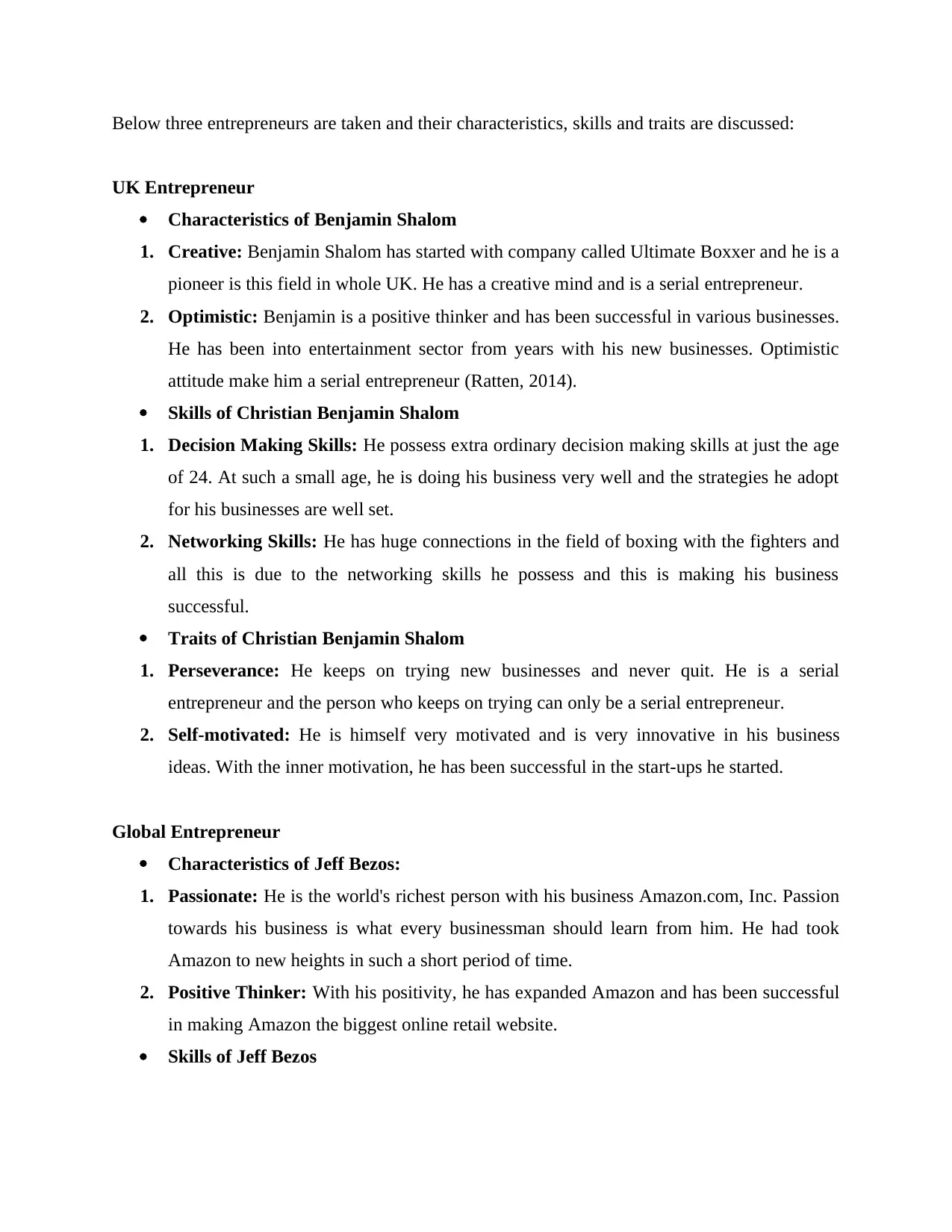
Below three entrepreneurs are taken and their characteristics, skills and traits are discussed:
UK Entrepreneur
Characteristics of Benjamin Shalom
1. Creative: Benjamin Shalom has started with company called Ultimate Boxxer and he is a
pioneer is this field in whole UK. He has a creative mind and is a serial entrepreneur.
2. Optimistic: Benjamin is a positive thinker and has been successful in various businesses.
He has been into entertainment sector from years with his new businesses. Optimistic
attitude make him a serial entrepreneur (Ratten, 2014).
Skills of Christian Benjamin Shalom
1. Decision Making Skills: He possess extra ordinary decision making skills at just the age
of 24. At such a small age, he is doing his business very well and the strategies he adopt
for his businesses are well set.
2. Networking Skills: He has huge connections in the field of boxing with the fighters and
all this is due to the networking skills he possess and this is making his business
successful.
Traits of Christian Benjamin Shalom
1. Perseverance: He keeps on trying new businesses and never quit. He is a serial
entrepreneur and the person who keeps on trying can only be a serial entrepreneur.
2. Self-motivated: He is himself very motivated and is very innovative in his business
ideas. With the inner motivation, he has been successful in the start-ups he started.
Global Entrepreneur
Characteristics of Jeff Bezos:
1. Passionate: He is the world's richest person with his business Amazon.com, Inc. Passion
towards his business is what every businessman should learn from him. He had took
Amazon to new heights in such a short period of time.
2. Positive Thinker: With his positivity, he has expanded Amazon and has been successful
in making Amazon the biggest online retail website.
Skills of Jeff Bezos
UK Entrepreneur
Characteristics of Benjamin Shalom
1. Creative: Benjamin Shalom has started with company called Ultimate Boxxer and he is a
pioneer is this field in whole UK. He has a creative mind and is a serial entrepreneur.
2. Optimistic: Benjamin is a positive thinker and has been successful in various businesses.
He has been into entertainment sector from years with his new businesses. Optimistic
attitude make him a serial entrepreneur (Ratten, 2014).
Skills of Christian Benjamin Shalom
1. Decision Making Skills: He possess extra ordinary decision making skills at just the age
of 24. At such a small age, he is doing his business very well and the strategies he adopt
for his businesses are well set.
2. Networking Skills: He has huge connections in the field of boxing with the fighters and
all this is due to the networking skills he possess and this is making his business
successful.
Traits of Christian Benjamin Shalom
1. Perseverance: He keeps on trying new businesses and never quit. He is a serial
entrepreneur and the person who keeps on trying can only be a serial entrepreneur.
2. Self-motivated: He is himself very motivated and is very innovative in his business
ideas. With the inner motivation, he has been successful in the start-ups he started.
Global Entrepreneur
Characteristics of Jeff Bezos:
1. Passionate: He is the world's richest person with his business Amazon.com, Inc. Passion
towards his business is what every businessman should learn from him. He had took
Amazon to new heights in such a short period of time.
2. Positive Thinker: With his positivity, he has expanded Amazon and has been successful
in making Amazon the biggest online retail website.
Skills of Jeff Bezos
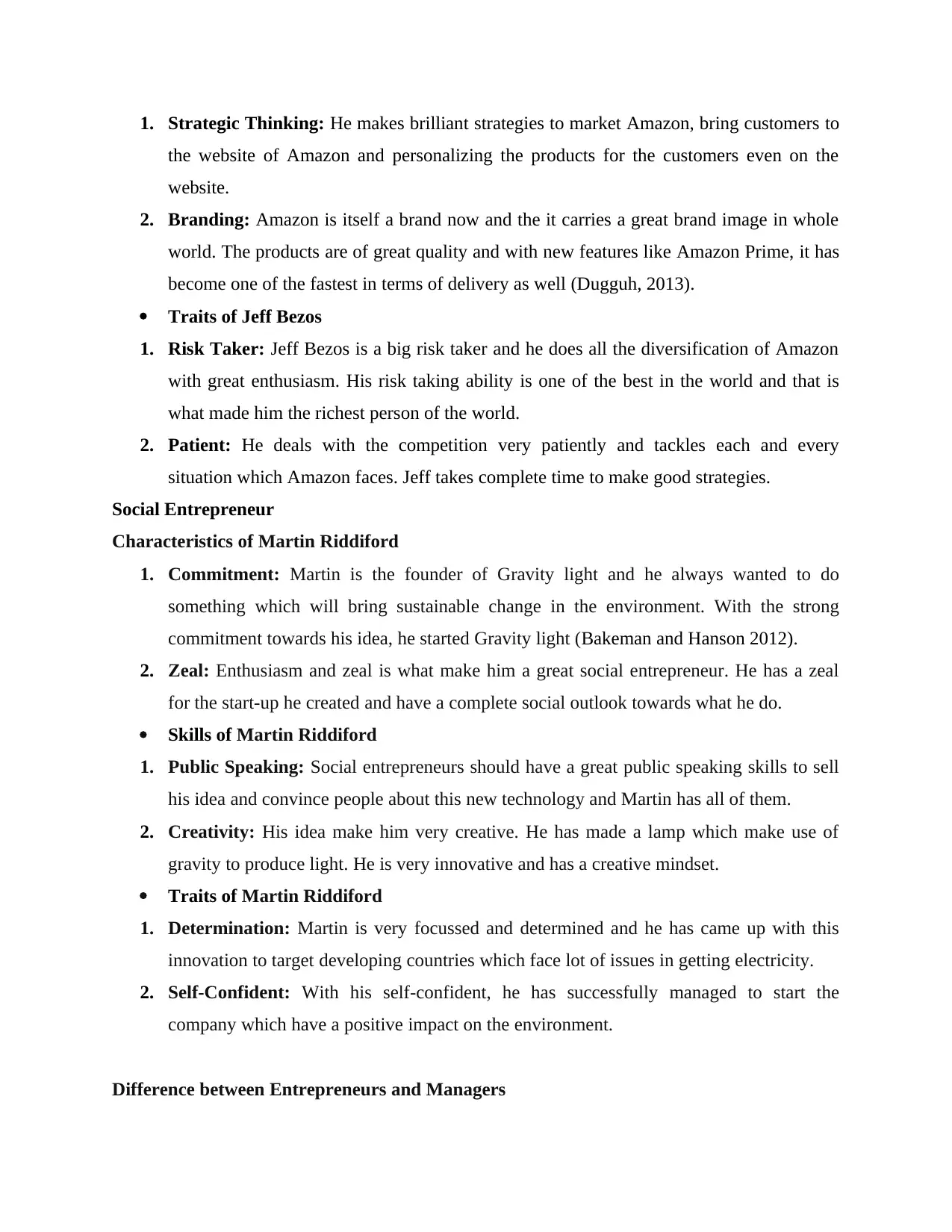
1. Strategic Thinking: He makes brilliant strategies to market Amazon, bring customers to
the website of Amazon and personalizing the products for the customers even on the
website.
2. Branding: Amazon is itself a brand now and the it carries a great brand image in whole
world. The products are of great quality and with new features like Amazon Prime, it has
become one of the fastest in terms of delivery as well (Dugguh, 2013).
Traits of Jeff Bezos
1. Risk Taker: Jeff Bezos is a big risk taker and he does all the diversification of Amazon
with great enthusiasm. His risk taking ability is one of the best in the world and that is
what made him the richest person of the world.
2. Patient: He deals with the competition very patiently and tackles each and every
situation which Amazon faces. Jeff takes complete time to make good strategies.
Social Entrepreneur
Characteristics of Martin Riddiford
1. Commitment: Martin is the founder of Gravity light and he always wanted to do
something which will bring sustainable change in the environment. With the strong
commitment towards his idea, he started Gravity light (Bakeman and Hanson 2012).
2. Zeal: Enthusiasm and zeal is what make him a great social entrepreneur. He has a zeal
for the start-up he created and have a complete social outlook towards what he do.
Skills of Martin Riddiford
1. Public Speaking: Social entrepreneurs should have a great public speaking skills to sell
his idea and convince people about this new technology and Martin has all of them.
2. Creativity: His idea make him very creative. He has made a lamp which make use of
gravity to produce light. He is very innovative and has a creative mindset.
Traits of Martin Riddiford
1. Determination: Martin is very focussed and determined and he has came up with this
innovation to target developing countries which face lot of issues in getting electricity.
2. Self-Confident: With his self-confident, he has successfully managed to start the
company which have a positive impact on the environment.
Difference between Entrepreneurs and Managers
the website of Amazon and personalizing the products for the customers even on the
website.
2. Branding: Amazon is itself a brand now and the it carries a great brand image in whole
world. The products are of great quality and with new features like Amazon Prime, it has
become one of the fastest in terms of delivery as well (Dugguh, 2013).
Traits of Jeff Bezos
1. Risk Taker: Jeff Bezos is a big risk taker and he does all the diversification of Amazon
with great enthusiasm. His risk taking ability is one of the best in the world and that is
what made him the richest person of the world.
2. Patient: He deals with the competition very patiently and tackles each and every
situation which Amazon faces. Jeff takes complete time to make good strategies.
Social Entrepreneur
Characteristics of Martin Riddiford
1. Commitment: Martin is the founder of Gravity light and he always wanted to do
something which will bring sustainable change in the environment. With the strong
commitment towards his idea, he started Gravity light (Bakeman and Hanson 2012).
2. Zeal: Enthusiasm and zeal is what make him a great social entrepreneur. He has a zeal
for the start-up he created and have a complete social outlook towards what he do.
Skills of Martin Riddiford
1. Public Speaking: Social entrepreneurs should have a great public speaking skills to sell
his idea and convince people about this new technology and Martin has all of them.
2. Creativity: His idea make him very creative. He has made a lamp which make use of
gravity to produce light. He is very innovative and has a creative mindset.
Traits of Martin Riddiford
1. Determination: Martin is very focussed and determined and he has came up with this
innovation to target developing countries which face lot of issues in getting electricity.
2. Self-Confident: With his self-confident, he has successfully managed to start the
company which have a positive impact on the environment.
Difference between Entrepreneurs and Managers
⊘ This is a preview!⊘
Do you want full access?
Subscribe today to unlock all pages.

Trusted by 1+ million students worldwide
1 out of 19
Related Documents
Your All-in-One AI-Powered Toolkit for Academic Success.
+13062052269
info@desklib.com
Available 24*7 on WhatsApp / Email
![[object Object]](/_next/static/media/star-bottom.7253800d.svg)
Unlock your academic potential
Copyright © 2020–2026 A2Z Services. All Rights Reserved. Developed and managed by ZUCOL.





